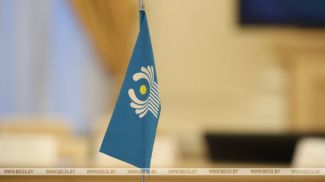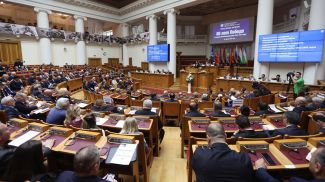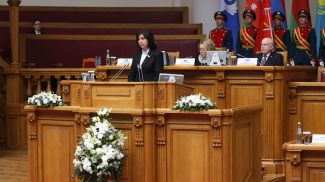MINSK, 29 June (BelTA) – Model legislation is being worked out in the Union State of Belarus and Russia in order to harmonize national approaches to digital technologies. Chairman of the Legislation and State Construction Commission of the Council of the Republic of the National Assembly of Belarus Sergei Sivets made the statement at a panel session held as part of the 8th Forum of Regions of Belarus and Russia on 29 June to discuss promising aspects of the law and digitization in the Union State of Belarus and Russia, BelTA has learned.
During the panel session Sergei Sivets mentioned the importance of digital technologies. He said in the age of information technologies their influence on all the state and public institutions is huge on the scale of one country and on the scale of integration structures. “New public relations require new approaches to the digital formalization of this process. We have a rather broad field for cooperation, for working out common approaches to the emergence of new terms and notions relating to digitization. These days we talk about crypto currency, blockchain technology, smart contracts, and the rest. It is necessary to work out their clear definitions in legislation. New regulatory acts have to be passed for it. We already have examples of how Belarus and Russia have advanced on the way of legislating new institutions and notions,” Sergei Sivets said. It means there are objects for comparing Belarusian and Russian practices and the panel session offers an opportunity to do just that.
The Belarusian senator also noted that the sides are intent on using model laws as they develop the legal system of the Union State of Belarus and Russia. Digital economy is one of the priorities. The strategic directions include the harmonization of approaches in such spheres as the use of taxi service aggregators, the application and regulation of payment system aggregators, the regulation of digital financial payments, matters concerning robotization and the use of artificial intelligence. It is necessary to draft model laws, which will be in the center of attention of the Belarusian parliament and the Russian one.
Among the advantages information technologies provide in the legal sphere Sergei Sivets mentioned the harmonious development of relations between the state, the society, and the person. He also mentioned the debureaucratization of the state administration system, the automation of the lawmaking process, assistance with rapid acquisition and dissemination of information. “But digitization also involves certain risks and threats. It is important to share cutting-edge experience concerning problems in the sphere of information technologies in various areas of public relations,” he said.
In turn, First Deputy Chairman of the Constitutional Legislation and State Construction Committee of the Federation Council of the Federal Assembly of the Russian Federation Vladimir Poletayev noted that there is a serious problem with ensuring digital sovereignty. He noted that new threats and risks emerge. He also mentioned the problem of finding optimal models for regulating the Internet at the national level and the supranational one. Vladimir Poletayev said that the development of legislation meant to regulate public relations relating to information and communication technologies continues. Digital relations are now regulated at the international level as standardization and unification processes go on in the spheres of communication and international trade. Vladimir Poletayev mentioned the key topics the Russian side would like to discuss during the forum: search for balance between information security of the Union State of Belarus and Russia and the observance of human rights.
Deputy State Secretary, member of the Standing Committee of the Union State of Belarus and Russia Aleksei Kubrin noted that amending the legislation is a complex process, all the security elements, including information security, are correlated with each other, respectively the influence of any component needs to be reflected in documents, including documents of the Union State of Belarus and Russia. Belarus and Russia are now implementing the information security program Parity. According to Aleksei Kubrin, it is necessary to address a broader range of issues. He suggested making a decision on the relevant avenues of work for the sake of preparing a full-fledged strategic concept on security within the framework of the Union State of Belarus and Russia.
Director of the National Center of Legislation and Legal Research of the Republic of Belarus Vadim Ipatov stressed the importance of the fundamental human right to the protection of personal data in conditions when the existing legislation is not always effective. “The matter of protection of personal data is becoming much larger as information technologies develop. The fact that personal data can be processed abroad without notifying the person is a problem. The situation is deteriorated when people disclose their own personal data via social networks. The matter of the legal protection of personal data becomes important,” he noted. But information technologies develop faster than the legislation. The introduction of Big Data technologies represents a challenge to the basic principles of legislation.
The panel session is supposed to produce recommendations for various government agencies of Belarus and Russia, the Standing Committee of the Union State of Belarus and Russia, and the Parliamentary Assembly of the Union State of Belarus and Russia.
The Forum of Regions of Belarus and Russia has been held for eight years under the aegis of the upper chambers of the Belarusian parliament and the Russian one – the Council of the Republic of the National Assembly of Belarus and the Federation Council of the Federal Assembly of the Russian Federation. The 8th Forum of Regions of Belarus and Russia began on 29 June to last through 1 July. Most of the events are held in the videoconference mode due to the COVID-19 pandemic. This year's forum is focused on scientific and technical cooperation in the age of digitization due to the special importance of forming common scientific and technological space in the course of integrating the Russian Federation and the Republic of Belarus.













